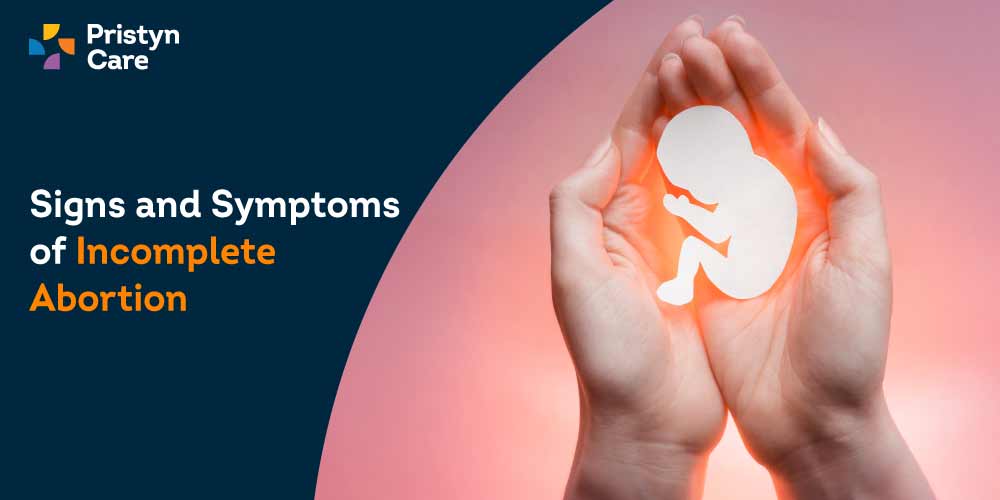![]() Views: 50,876
Views: 50,876
Signs and Symptoms of Incomplete Abortion
Dedicated Support at Every Step!
Our Doctors are available 24 hours a day, 7 days a week to help you!
Fortunately, there are no potential complications related to incomplete abortion, yet it can be fatal if it persists for a long duration. Therefore, it is important to spot early signs and symptoms and seek treatment help timely.
Table of Contents
Signs and Symptoms of Incomplete Abortion
Incomplete abortion occurs when a few pregnancy tissues remain in the womb. This, in turn, leads to painful symptoms that require medical attention. The chances of incomplete abortion escalate in the case of medical abortion. However, the abortion can be incomplete regardless of the type of procedure you are undergoing. The intensity of the symptoms of incomplete abortion can be mild, moderate, or severe. A patient can experience the following symptoms:
- Vaginal bleeding: Moderate to severe vaginal bleeding is a common symptom of incomplete abortion that should not be ignored.
- Pain and discomfort: Women can experience frequent lower abdomen or pelvic discomfort that spreads to the lower back, buttocks, genitalia, and perineum.
- Blood clot discharge: There is a chance of blood clot discharge. It is a common symptom of incomplete abortion.
- Fever, chills, and nausea: In some cases, a woman can experience persistent fever, chills, and diarrhea soon after the abortion, which may indicate incomplete abortion. Moreover, you can also feel nauseated and can experience frequent vomiting.
No Cost EMI, Hassle-free Insurance Approval
Diagnosis and Treatment of Incomplete Abortion
- Diagnosis of incomplete abortion:
To diagnose incomplete abortion, the doctor performs a pelvic exam to see if the cervix has opened and thinned out. Other tests and exams that can indicate an incomplete abortion include:
- Physical Examination: If the patient has passed tissue and blood clots through the vagina, it is examined in the lab to confirm the abortion and check whether the patient's symptoms are related to any other health condition.
- Ultrasound: The gynecologist will conduct an abdominal or vaginal ultrasound to check fetal development and heartbeat.
- Hysteroscopy: A doctor usually recommends a potential hysteroscopy test for incomplete abortion between the 4-12 gestational week duration.
- Quantitative Human Chorionic Gonadotropin (hCG) Level: This test is performed to check and compare pregnancy hormone (hCG) levels from previous measurements. In case any abnormality is found in the pattern, it indicates a problem.
- Complete Blood Count (CBC): It is performed to identify the amount of blood loss.
- White Blood Count (WBC): So as to rule out the possibility of an infection or ectopic pregnancy (the pregnancy that occurs outside the uterus).
- Treatment of incomplete abortion:
If you exhibit signs of incomplete abortion, then you must seek treatment help as soon as possible. Early treatment of an incomplete abortion can reduce the risk of infection and significant blood loss. Discuss the advantages and disadvantages of each treatment option carefully with the doctor before choosing one, expressing any priorities or concerns.
Generally, there are two treatment approaches to expel the remaining pregnancy tissues.
Non-surgical treatment of incomplete abortion:
- Expectant Management: Most of the time, the patient's body naturally excretes the pregnancy-related waste. If an incomplete abortion occurs before or during the first trimester of pregnancy, it is a very effective treatment option. It is a minimally invasive procedure. The patients who select expectant care, however, can later require a D and C surgical treatment. In some rare cases, there is a higher chance of significant and ongoing bleeding.
- Medical Treatment: Misoprostol is frequently used to remove remaining fetal tissues. Misoprostol has an 80–99% success rate. The medication makes the uterus contract, expelling the remaining pregnancy tissues. Compared to expectant management, it is a quicker method of treatment. However, you may require a surgical option if the pregnancy tissue is not completely removed from the uterus.
Surgical treatment of incomplete abortion
- Dilation and curettage (D&C) procedure: A doctor usually recommends D & C procedure to treat an incomplete abortion or to stop severe bleeding. The cervix is typically already open during the D and C procedure, therefore, no small surgical equipment or medications are used to dilate it. The doctor gathers and removes any retained remnants of pregnancy tissues from the uterus using gentle suction and a curette to scrape the inner surface of the organ. General anesthesia is used during the procedure to reduce pain and discomfort.
- Hysteroscopy: A thin, flexible tube with a camera is inserted through the cervix and into the uterus, allowing the doctor to see inside and identify any remaining tissue from the incomplete abortion. If any tissue is found, it can be removed during the hysteroscopy using specialized instruments.
Common Causes of Incomplete Abortion
Around 50% of incomplete abortions occur due to genetic problems in the developing baby. Various other reasons accounting for incomplete abortion include:
- Diabetes: High blood glucose levels can increase the chances of incomplete abortion. There is also a high chance of stillborn baby birth.
- Hypertension: It eventually leads to high blood pressure directly at the arteries and may, in turn, lead to pregnancy loss and incomplete abortion.
- Kidney Disease: It can elevate fetal complexities and eventually leads to pregnancy loss and incomplete abortion.
- Thyroid imbalance: Hypothyroidism or hyperthyroidism is directly linked to fetal problems and pregnancy loss. It may also result in incomplete abortion.
- Thrombophilia: It is a condition in which the blood can form into clots too quickly. Inherited thrombophilia can be potentially responsible for incomplete pregnancy as it can impair placenta function by causing venous thrombosis (blood clot in the vein).
- Abnormal or incompetent cervix: It is a condition in which weak cervical tissue causes premature birth or loss of a healthy pregnancy.
- Obesity: It amplifies the complications related to incomplete abortion. It increases the risk of insulin resistance and thyroid dysfunction. It also degrades the quality of oocytes.
Risks and Complications of Incomplete Abortion
The complications of incomplete abortion are rare, but it bears certain risks if not treated on time. If the patient has expelled a pregnancy tissue through the vagina naturally or through medication, it must be examined to rule out the possibility of a rare condition known as a hydatidiform mole. Remaining pregnancy tissues inside the womb can lead to complications. Listed below are the risks and complications of incomplete abortion:
- Heavy bleeding: Incomplete abortion can cause heavy bleeding, which can lead to anemia, excessive blood loss, shock, and death in rare cases. The blood discharge is accompanied by blood clots or pieces of tissue.
- Infection in the uterus: The chances of infection are high if pregnancy tissue or placenta remains inside the uterus after incomplete abortion.
- Cervical dilation: If the abortion is incomplete, there is a higher chance of cervical dilation. In dilation, the cervix widens in width.
- Severe cramps: Incomplete abortion can cause severe cramps and lower abdominal pain. The pain is managed by medication.
- Retained tissue: Some remaining tissue of the fetus stay behind even after possible removal, which can cause cramps, pain, and further complications.
- Scarring: Incomplete abortion can lead to uterine scarring, resulting in infertility and complications with conceiving a baby.
- Psychological effect: Incomplete abortion can lead to psychological problems such as drug abuse, eating disorders, guilt, regret, and decreased self-esteem.
Conclusion
In conclusion, a woman's health may suffer greatly due to incomplete abortion. It's critical to be aware of the warning signs and symptoms of an incomplete abortion, which include severe vaginal bleeding, discomfort during sex, abdominal pain, fever, and foul-smelling discharge. Seeking prompt medical attention is crucial to avoid potentially life-threatening complications. These symptoms should be watched out for by women who have recently had an abortion they should be treated right once if they appear.










